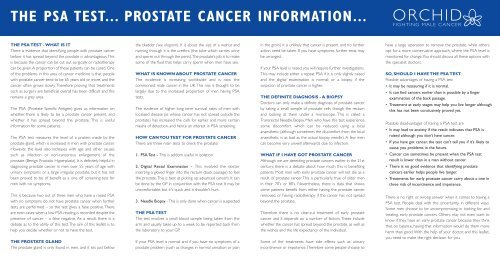PSA test - Orchid
PSA test - Orchid
PSA test - Orchid
You also want an ePaper? Increase the reach of your titles
YUMPU automatically turns print PDFs into web optimized ePapers that Google loves.
THE <strong>PSA</strong> TEST... PROSTATE CANCER INFORMATION...<br />
THE <strong>PSA</strong> TEST - WHAT IS IT<br />
There is evidence that identifying people with prostate cancer<br />
before it has spread beyond the prostate is advantageous. This<br />
is because the cancer can be cut out surgically or radiotherapy<br />
can be given. A proportion of these patients can be cured. One<br />
of the problems in this area of cancer medicine is that people<br />
with prostate cancer tend to be 65 years old or more, and the<br />
cancer often grows slowly. Therefore proving that treatments<br />
such as surgery are beneficial overall has been difficult and this<br />
remains a grey area.<br />
The <strong>PSA</strong> (Prostate Specific Antigen) gives us information on<br />
whether there is likely to be a prostate cancer present, and<br />
whether it has spread beyond the prostate. This is useful<br />
information for some patients.<br />
The <strong>PSA</strong> <strong>test</strong> measures the level of a protein made by the<br />
prostate gland, which is increased in men with prostate cancer.<br />
However, the level also increases with age and other causes<br />
such as infection or non-cancerous enlargement of the<br />
prostate (Benign Prostatic Hyperplasia). It is definitely helpful in<br />
diagnosing prostate cancer in men over 55 years of age with<br />
urinary symptoms or a large irregular prostate, but it has not<br />
been proved to be of benefit as a one off screening <strong>test</strong> for<br />
men with no symptoms.<br />
This is because two out of three men who have a raised <strong>PSA</strong><br />
with no symptoms do not have prostate cancer when further<br />
<strong>test</strong>s are performed – so the <strong>test</strong> gives a false positive. There<br />
are even cases when a low <strong>PSA</strong> reading is recorded despite the<br />
presence of cancer – a false negative. As a result, there is a<br />
debate as to the utility of this <strong>test</strong>. The aim of this leaflet is to<br />
help you decide whether or not to have the <strong>test</strong>.<br />
THE PROSTATE GLAND<br />
The prostate gland is only found in men, and it sits just below<br />
the bladder (see diagram). It is about the size of a walnut and<br />
running through it is the urethra (the tube which carries urine<br />
and sperm out through the penis). The prostate’s job is to make<br />
some of the fluid that helps carry sperm when men have sex.<br />
WHAT IS KNOWN ABOUT PROSTATE CANCER<br />
The incidence is increasing worldwide and is now the<br />
commonest male cancer in the UK. This rise is thought to be<br />
largely due to the increased proportion of men having <strong>PSA</strong><br />
<strong>test</strong>s.<br />
The evidence of higher long term survival rates of men with<br />
localised disease (ie whose cancer has not spread outside the<br />
prostate) has increased the calls for earlier and more certain<br />
means of detection, and hence an interest in <strong>PSA</strong> screening.<br />
HOW CAN YOU TEST FOR PROSTATE CANCER<br />
There are three main <strong>test</strong>s to check the prostate:<br />
1. <strong>PSA</strong> Test - This is seldom useful in isolation.<br />
2. Digital Rectal Examination - This involved the doctor<br />
inserting a gloved finger into the rectum (back passage) to feel<br />
the prostate. This is best at picking up advanced cancers. It can<br />
be done by the GP in conjunction with the <strong>PSA</strong> <strong>test</strong>. It may be<br />
uncomfortable, but it's quick and it shouldn't hurt.<br />
3. Needle Biopsy - This is only done when cancer is suspected<br />
THE <strong>PSA</strong> TEST<br />
The <strong>test</strong> involves a small blood sample being taken from the<br />
arm and usually takes up to a week to be reported back from<br />
the laboratory to your GP.<br />
If your <strong>PSA</strong> level is normal and if you have no symptoms of a<br />
prostate problem (such as changes in normal urination or pain<br />
in the groin) it is unlikely that cancer is present and no further<br />
action need be taken. If you have symptoms further <strong>test</strong>s may<br />
be arranged.<br />
If your <strong>PSA</strong> level is raised, you will require further investigations.<br />
This may include either a repeat <strong>PSA</strong> if it is only slightly raised<br />
and the digital examination is normal; or a biopsy if the<br />
suspicion of prostate cancer is higher.<br />
THE DEFINITE DIAGNOSIS - A BIOPSY<br />
Doctors can only make a definite diagnosis of prostate cancer<br />
by taking a small sample of prostate cells though the rectum<br />
and looking at them under a microscope. This is called a<br />
Transrectal Needle Biopsy. Men who have this <strong>test</strong> experience<br />
some discomfort which can be reduced using a local<br />
anaesthetic (although sometimes the discomfort from the local<br />
anaesthetic is as bad as the actual biopsy needle). A few men<br />
can become very unwell afterwards due to infection.<br />
WHAT IF I HAVE GOT PROSTATE CANCER<br />
Although we are detecting prostate cancers earlier in the 21st<br />
century, there is a debate about how much this is benefiting<br />
patients. Most men with early prostate cancer will not die as a<br />
result of prostate cancer. This is particularly true of older men<br />
in their 70’s or 80’s. Nevertheless, there is data that shows<br />
some patients benefit from either having the prostate cancer<br />
removed, or having radiotherapy if the cancer has not spread<br />
beyond the prostate.<br />
Therefore there is no clear-cut treatment of early prostate<br />
cancer and it depends on a number of factors. These include<br />
whether the cancer has spread beyond the prostate, as well as<br />
the wishes and the life expectancy of the individual.<br />
Some of the treatments have side effects such as urinary<br />
incontinence or impotence. Therefore some people choose to<br />
have a large operation to remove the prostate, while others<br />
opt for a more conservative approach, where the <strong>PSA</strong> level is<br />
monitored for change. You should discuss all these options with<br />
the specialist doctors.<br />
SO, SHOULD I HAVE THE <strong>PSA</strong> TEST<br />
Possible advantages of having a <strong>PSA</strong> <strong>test</strong><br />
• It may be reassuring if it is normal.<br />
• It can find cancers earlier than is possible by a finger<br />
examination of the back passage.<br />
• Treatment at early stages may help you live longer although<br />
this has not been conclusively proved yet.<br />
Possible disadvantages of having a <strong>PSA</strong> <strong>test</strong> are<br />
• It may lead to anxiety if the result indicates that <strong>PSA</strong> is<br />
raised although you don’t have cancer.<br />
• If you have got cancer, the <strong>test</strong> can’t tell you if it’s likely to<br />
cause you problems in the future.<br />
• Cancer can sometimes be present when the <strong>PSA</strong> <strong>test</strong><br />
result is lower than in a man without cancer.<br />
• There is no good evidence that identifying prostate<br />
cancers earlier helps people live longer.<br />
• Treatments for early prostate cancer carry about a one in<br />
three risk of incontinence and impotence.<br />
There is no right or wrong answer when it comes to having a<br />
<strong>PSA</strong> <strong>test</strong>. People deal with this uncertainty in different ways.<br />
Some men choose to be uncompromising in looking for, and<br />
treating, early prostate cancers. Others may not even want to<br />
know if they have an early prostate cancer because they think<br />
that, on balance, having that information would do them more<br />
harm than good. With the help of your doctor, and this leaflet,<br />
you need to make the right decision for you.













